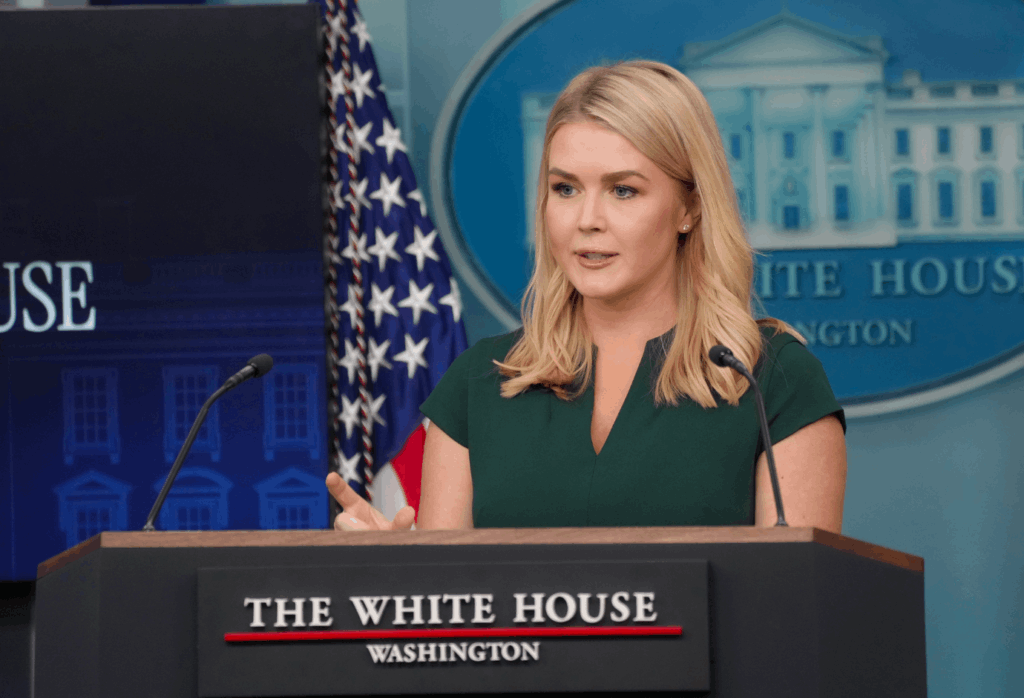In a surprising and unusually public exchange, the White House has responded to pop superstar Ariana Grande on social media, sparking a flurry of reactions across political and entertainment circles. The interaction began when Grande reshared a post on Instagram that questioned whether the lives of Trump supporters would truly improve under a potential second term for the former president. The post highlighted a range of contemporary concerns, including ICE enforcement practices, transgender rights, issues surrounding free speech, and the growing cost-of-living pressures facing many Americans. While her resharing did not explicitly endorse any political perspective, it drew immediate attention from political commentators and social media users, ultimately prompting a response from the White House itself. Karoline Leavitt, a spokesperson for the administration, addressed Grande

directly in a message that combined pop culture references with political commentary, stating: “Hold your tears, Ariana. Because President Trump’s actions ended Joe Biden’s inflation crisis and are bringing in trillions of dollars in new investments. He even miraculously signed an executive order that paved the way for the FTC to punish Ticketmaster for scamming fans into attending an Ariana Grande concert. Get well soon, Ariana!” The unusual nature of the statement caught the public off guard, blending the realms of celebrity culture with policy discussion in a way that is rare for official communications.
The response leveraged Ariana Grande’s own lyrics, a move that immediately drew attention from both her fanbase and political observers. By referencing her artistic output, the White House framed its commentary in a way that spoke directly to her audience, while also defending the administration’s economic record and highlighting regulatory actions taken during the previous term. Among the claims made in Leavitt’s statement was the assertion that Trump had “ended Joe Biden’s inflation crisis,” a reference to the administration’s economic narrative emphasizing low unemployment, investment growth, and fiscal initiatives. Additionally, the mention of the FTC’s intervention against Ticketmaster served as a nod to ongoing public frustrations with ticketing platforms and corporate accountability, an issue that has affected fans of major artists, including Grande, in recent years. The statement, delivered in a tone that was both celebratory and lightly humorous, underscores a growing trend in political communication: the deliberate use of social media interactions with celebrities to amplify messaging and reach younger audiences.

Reaction to the exchange has been mixed. Many of Ariana Grande’s fans took to social media to express confusion or amusement, noting the unusual combination of pop culture references with formal political claims. Some praised the playful approach, while others questioned whether such a direct interaction between government representatives and entertainers sets a new precedent in political discourse. Political analysts have observed that the response is indicative of a broader strategy to engage voters and the public through non-traditional channels, including Instagram, Twitter, and other platforms where celebrity influence is significant. By directly addressing a figure like Grande, the administration may be attempting to demonstrate both cultural awareness and responsiveness to public sentiment, though it inevitably raises questions about the blending of policy messaging with entertainment-focused narratives.
Meanwhile, the topics that Grande highlighted in her original reshared post—ranging from ICE policies to free speech debates—remain central to public discussion, illustrating the power of social media to frame political discourse around personal values, social justice concerns, and the lived experiences of Americans. By engaging with her post, the White House inserted its perspective into these conversations, drawing attention to economic accomplishments and regulatory measures while also employing humor and cultural references. While some commentators have noted that this approach risks oversimplifying complex issues, others argue that it represents an innovative method of communication in an era where traditional press briefings and official statements often fail to capture widespread attention.
This episode also reflects the increasingly intertwined nature of celebrity culture and politics, where public figures—especially musicians, actors, and athletes—have significant influence over social media conversations that reach millions of people instantly. Grande’s resharing of the post was not only a reflection of her personal opinions but also a demonstration of how pop culture can serve as a lens for political discussion. The White House’s response, in turn, highlights a willingness to meet these cultural figures in their own domain, creating a dialogue that blurs the line between entertainment and governance. As such, the exchange has become a notable example of the evolving strategies through which political institutions seek to engage with a younger, digitally connected demographic, leveraging both humor and relevance to stay part of online conversations.

Ultimately, the interaction between Ariana Grande and the White House may be remembered as a rare moment where pop culture and politics collided in a highly visible and public manner. It demonstrates the continued importance of social media in shaping public narratives and underscores the influence that celebrities can exert on political discussions. While reactions are sure to evolve in the coming days, the episode already serves as a case study in modern political communication, highlighting both the opportunities and the challenges of engaging with audiences in a digital landscape dominated by immediacy, cultural resonance, and viral attention.